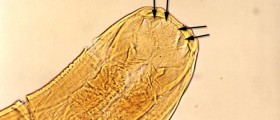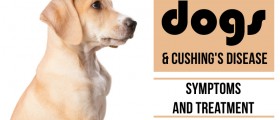
Dog worms are parasites that can infect the dog’s intestines and feed inside of them. They can cause many dog diseases and affect their general health so it is important for dog owners to recognize the signs of worms in their pets so they can treat them and prevent possible complications.
There are five kinds of worms that can affect a dog - roundworms, tapeworms, hookworms, whipworms and heartworms. Roundworms are the most common in dogs.
Worms get inside a dog’s body when it licks surfaces that may be contaminated with worm eggs like floors, eating dishes, places where it sleeps, and similar. The eggs hatch out inside the dog’s intestines and within ten days start feeding.
Symptoms of dog worms
The usual symptoms of the presence of worms in the dog’s body includes coughing, vomiting, diarrhea, loss of appetite, pot belly, dull-looking hair, hot and dry nose, pale skin, fatigue and low energy levels and foul breath.
Roundworms
Roundworms are the most common parasites that attack dogs usually puppies. There are two kinds, Toxocara canis and Toxascaris leonina. Puppies can contract roundworms through mother’s milk or by eating or licking the infected soil or objects. Eggs can survive for a long period of time in soil so it is not hard for the puppies to ingest them.
Once they are hatched, roundworms can be found in the dog’s vomit or more commonly feces. Depending on the kind they can grow up to seven inches in length and they are shaped like spaghetti. They are usually white or yellow.
Roundworms absorb the nutrients inside the intestines, which leads to weakness and fatigue in the dog. They can also cause damage to the lining of the intestines.
Diagnosis and treatment
Roundworms and other parasites can be diagnosed by examining the feces. If the eggs are found, it means that the dog has worms. The treatment consists of oral medicines called de-wormers that are administered as long as there are eggs in the feces.
Deworming medicines work as anesthetics they virtually paralyze the worms so they are not able to cling onto the intestines and they can be expelled with bowel movement.
Prevention
Good hygiene is important for fighting the worms in dogs. This means cleaning the house frequently especially the floors and the backyard if the dog goes to the bathroom there.
Since the worms can pass to humans as well it is important to wash hands thoroughly.
Also, it is not uncommon for dogs who have worms to show no symptoms at all which is why it is recommended to administer de-worming medicines to puppies and young dogs anyway just to be safe.

















Your thoughts on this
Loading...